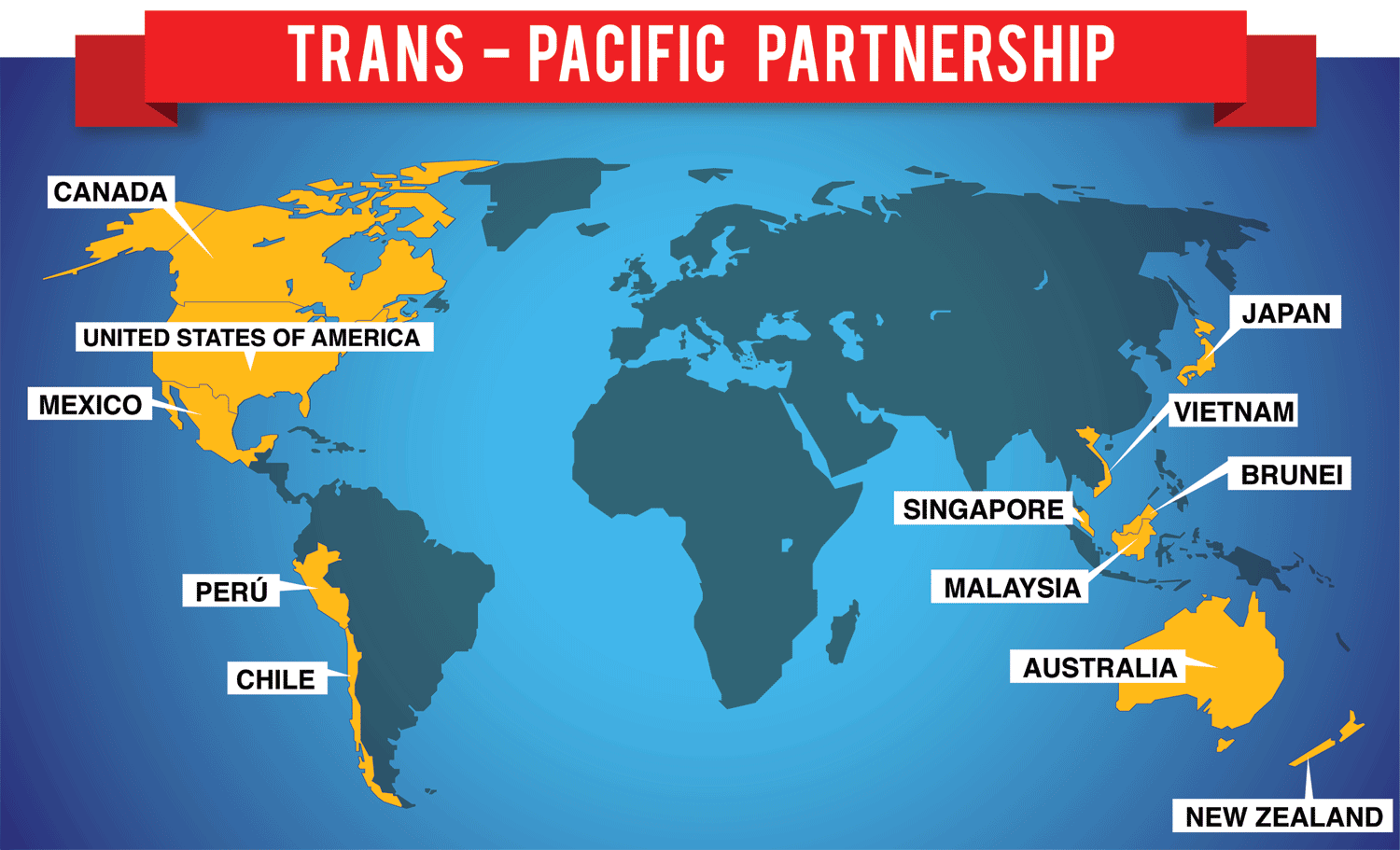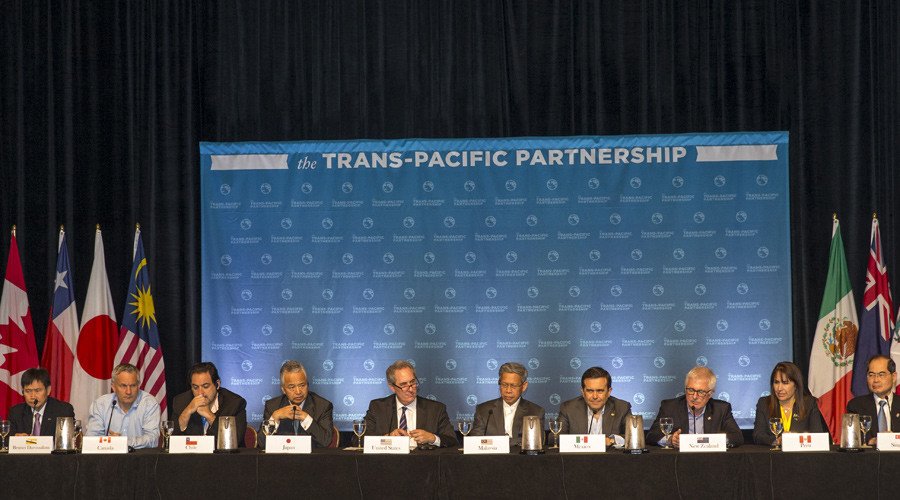
Trump Signed EO to Withdraw From TPP

After taking an oath, Donald Trump quick took actions by signing several executive orders. Just like what he promised during the campaign period, two days after his inauguration, he signed an executive order that withdraws the U.S. from the negotiating process of the Trans-Pacific Partnership. He stated that this action is “great thing for the American worker”. As a replacement, he promised to create a deal that has “fair bilateral trade deals that bring jobs and industry back to American shores”. From the very start, Trump didn’t support multinational trade agreements like TPP. He argued that only the companies gain benefits while Americans are left to suffer from no job opportunities.

For those who don’t understand what TPP or Trans-Pacific Partnership Agreement is, it is a major trading deal between the U.S. and other countries along the rim of the Pacific Ocean including Japan, Vietnam, Malaysia, Brunei, Australia, Canada, Mexico, New Zealand, Singapore, Vietnam, Peru, and Chile. When combined, these countries are responsible for 40% of the whole world’s GDP and 26% of the world’s trade. According to the data, there is a total of $242 billion of services in 2011 and a total of $1.5 trillion of trade goods in 2012. Under the U.S. government, this trade deal is one of the most significant events under Barack Obama’s administration. It was only signed in February 2016 after seven years of negotiation. In the TPP, it aims that the tariffs, other trade barriers, and unifying regulations on good and services will be removed. It also covers agriculture, carmakers, and technology firms. However, many critics pointed out that this threatens the jobs in the U.S. Furthermore, it even helps private companies to file a lawsuit against national governments in case they break the terms of TPP or approve a law that can harm their business. This obviously shows that the trade deal is about the profit of the private sector. In addition, many people are quick to point out that China is not included. Thus, some speculations stated that it is a strategy to ‘contain’ China and be able to match its growing economy. However, due to Trump’s executive order, this trade deal might collapse.
Though U.S. has withdrawn from the deal, some of the leaders of the involved countries are still hopeful to pursue it. Malcolm Turnbull, the Prime Minister of Australia, had already held a meeting with Lee Hsien Loong, Prime Minister of Singapore, and Bill English, the Prime Minister of New Zealand. They even discussed a possibility of proceeding with the TPP.

Most people are not aware of the effects that the TPP will bring in case that it finally pushes through. One of the most controversial aspects included in this trade deal is the copyright law – Digital Millennium Copyright Act. Under this law, the Congress has a limited ability to engage in domestic law that will help the American citizens and the innovative technology sector. Some of the requirements that the countries involved must follow are more restrictive than the existing international standards. Most of these require significant changes to these countries’ copyright laws. Some of these obligations are:
-
Expand Copyright Terms
Under the TPP agreement, the copyright term will be extended with the protection from life of the author plus 50 years to life plus 70 years of works created by individuals, and 70 years after publication or creation for corporate owned works.
-
Threats for Journalists and Whistleblowers
One notable part of the deal is the vague information about the misuse of trade secrets. It seems like that anyone who reveals or accesses the alleged confidential information through a ‘computer system’ will have to face harsh criminal punishments. This part of the deal is clearly frightening because people won’t be able to disclose information that may potentially harm the consumers. In case that a product or a service has a harmful effect, witnesses won’t be able to divulge this information to the public. As a result, it will only protect the interest of the private sector.
-
Heavy Criminal Sanctions to internet users
Even though the internet user doesn’t have any commercial motivation, he/she can be jailed, imposed with debilitating fines due to file sharing, or have their properties or domains to be seized and/or destroyed. The scariest part is that these actions can be done by the copyright holder without even filing a formal complaint.
There are still several major issues regarding the TPP agreement. However, it seems like the member countries need to back up a bit due to the withdrawal of the U.S. We will have to wait and see if China is willing to join this trade deal after being excluded.
More in Trending-
-
Avresti mai immaginato che queste sono le cifre sui conti delle celebrità? Guarda quanti soldi hanno
GRETA THUNBERG $ 1 MILIONE Greta Thunberg è l’attivista svedese che ormai da anni impazza sul web con le sue campagne...
February 11, 2026 -
Dies sind die teuersten Hollywood-Scheidungen aller Zeiten
Elin Nordegren und Tiger Woods – Angebliche Einigung über 100 Millionen Dollar Elin Nordegren ist vor allem als die Ex-Frau von Tiger...
February 10, 2026 -
Bei diesen Stars läuft es nicht nur im Beruf: Die schönsten Promi-Paare
Michael Schumacher und Corinna Schumacher – 33 Jahre Michael Schumacher, eine lebende Legende in der Welt der Formel 1 in Deutschland,...
February 10, 2026 -
Ma cosa fanno adesso queste celebrità?Scopriamolo
CLAUDIA MORI – 80 ANNI Claudia Mori compie oggi 80 anni, ma la sua carriera continua con la stessa intensità di...
February 10, 2026 -
Ma cosa fanno adesso queste celebrità?Scopriamolo
ALESSANDRA MARTINES – 61 ANNI Da ballerina classica ad attrice teatrale affermata, Alessandra Martines ha raggiunto grande popolarità negli anni ’90...
February 10, 2026 -
`
Rachel McAdams Honoured With Hollywood Walk of Fame Star
Rachel McAdams reached a career pinnacle with the unveiling of her star on the Hollywood Walk of Fame, an honor that...
February 6, 2026 -
Use These Brilliant T-Shirt Ideas to Break the Ice Without Trying
Florida Curves and Golden Glow Goals This is what Florida dreams are made of—curves, a killer tan, and a tank top...
February 5, 2026 -
The Beautiful and Grotesque: Body-Paint Ideas That’ll Leave You in Shock!
A Journey Across the Seas Art enthusiasts may recognize this as a different version of “Departure of the Winged Ship” by...
February 5, 2026 -
Onverwoestbare Liefdes: Deze Bekende Duo’s Bewijzen Dat Ware Liefde Echt Bestaat
James Franco & Isabel Pakzad James Franco, de beroemde Amerikaanse acteur, heeft door de jaren heen een reputatie opgebouwd als charmeur....
February 3, 2026



You must be logged in to post a comment Login